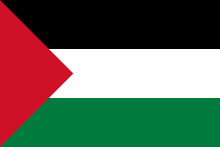National Progressive Front (Iraq)
The National Progressive Front ( Arabic الجبهة الوطنية التقدمية, DMG al-Ǧabha al-Waṭaniyya at-Taqaddumiyya , English National Progressive Front ), also National Progressive Front called, was a coalition between the ruling Baath party , communists and several block parties in Iraq . It existed from 1973/74 to 1979/80 and was based on the National Progressive Front in Syria , which is ruled by the Syrian Ba'ath Party . The aim was to introduce a multi-party system in the country that was ruled by the Ba'ath Party . In Command Council , however, no Nichtbaathisten were available.
Structure and members

On the eve of the Iraqi Baath Party coming to power in July 1968, Fuad ar-Rikabi had campaigned for a coalition of Nasserists, left Baathists (pro-Syrian wing of the Iraqi Baath) and communists. However, he was arrested and died in prison in 1971.
Individual communist personalities as ministers of state in the Iraqi cabinet had existed as early as May 1972. After the Iraqi-Soviet friendship pact was signed in 1972, the Iraqi Baath leadership began to involve the Iraqi Communist Party , which had been persecuted up to now . In 1973 a formal coalition was agreed, but the Kurdistan Democratic Party broke up over the question of participation in the government. Ubaidallah Barzani, the eldest son of the party founder, founded a rival party leadership and became Minister of State in Baghdad (1974–1980). Most of the time, only Kurdish individuals were behind other DPK splits.
The Progressive Patriotic National Front ( al-Jabha al-Wataniyya al-Qaumiyya al-Taqaddumiyya , abbreviation PPNF), which was formally formed in 1974 , included the Iraqi Baath Party:
- Iraqi Communist Party (since 1979/80 instead Iraqi Communist Vanguard Organization )
- Democratic Party of Kurdistan ( Neo-KDP , pro-Iraqi faction under Haschim Aqrawi , Ubaidullah Barzani and Ahmad Muhammad Said al-Atrushi )
- Kurdish Revolutionary Party (DPK split under Abd as-Sattar Sharif and Ibrahim Tahir Salam )
- Progressive Kurds Movement (further DPK split under Abdullah Ismail Ahmad )
- Independent Democrats Movement (added in 1975)
- Progressive Nationalist Movement (added in 1975)
Apparently (according to Sluglett) the communists had given themselves up to the belief that they could pull the Ba'ath party to the left. As in Syria, the non-Baathist parties were prohibited from engaging in agitation in the armed forces and security forces. In 1976 a law was passed making such non-Baathist agition in the armed forces a death penalty, and in 1978 several communists who tried to form a party cell in the army were executed. After the Communists left, the leadership of the National Front was composed differently again in 1980. However, a splinter group of the Iraqi Communist Party - the Iraqi Communist Vanguard Organization - continued to work with the Ba'ath Party and was represented by a member of parliament until 2003.
Despite a few communist and Kurdish ministers in the Iraqi central government, no non-Baathist member of the National Front has ever been accepted into the Revolutionary Command Council , the actual leadership of Iraq.
See also
literature
- Marion and Peter Sluglett: Iraq since 1958 - From Revolution to Dictatorship . Suhrkamp, Frankfurt 1991.
- Saddam Hussein : One Common Front Line or Two Opposing Fronts? . Ministry of Information (Iraq), Varese (Italy), July 1977.
- Ba'th Arab Socialist Party (Iraqi Region): The Political Report (adopted by the Eighth Regional Congress) , pp. 85-89 and 207f. Ministry of Information of the Republic of Iraq, January 1974.
Web links
Individual evidence
- ↑ Daniel Dishon: Middle East Record 1968 , page 512 in the Google Book Search. Tel Aviv 1973
- ^ Iraq: The National Progressive Front
- ↑ Lothar Rathmann (Ed.): History of the Arabs - From the beginnings to the present , Volume 6, Pages 215-219. Akademie-Verlag Berlin 1983
